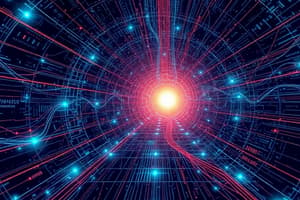Podcast
Questions and Answers
What is a characteristic of sensors used in nuclear reactors?
What is a characteristic of sensors used in nuclear reactors?
- They can be easily replaced if they fail.
- They are designed to provide output in a linear manner.
- They must operate effectively under severe conditions without replacement. (correct)
- They measure only temperature variations.
Which of the following physical properties can sensors measure?
Which of the following physical properties can sensors measure?
- Nutritional value
- Contamination/particulates (correct)
- Emotional response
- Cognitive load
Which physical phenomenon is NOT typically used in sensors for generating an output?
Which physical phenomenon is NOT typically used in sensors for generating an output?
- Thermodynamics in chemical reactions (correct)
- Capacitance in distance measurements
- Magnetic field strength in angle measurements
- Resistance changes in strain gauges
What type of measurements can use IR radiation?
What type of measurements can use IR radiation?
In sensors, how may the output relate to the input?
In sensors, how may the output relate to the input?
Which of the following is used to measure flow velocity or pressure?
Which of the following is used to measure flow velocity or pressure?
What is a common application for sensors measuring sound intensity?
What is a common application for sensors measuring sound intensity?
Which type of sensors detects ionising radiation?
Which type of sensors detects ionising radiation?
What is the primary purpose of a sensor as defined in the content?
What is the primary purpose of a sensor as defined in the content?
Which of the following factors must be considered when selecting a sensor for a specific purpose?
Which of the following factors must be considered when selecting a sensor for a specific purpose?
What type of output do most sensors generate in response to a physical phenomenon?
What type of output do most sensors generate in response to a physical phenomenon?
Which additional components might be needed to effectively use a sensor?
Which additional components might be needed to effectively use a sensor?
What is the aim for the students by the end of the lecture on sensors?
What is the aim for the students by the end of the lecture on sensors?
Which of the following best describes a potentiometer in the context of sensors?
Which of the following best describes a potentiometer in the context of sensors?
Why is it important for engineers to understand sensor outputs?
Why is it important for engineers to understand sensor outputs?
What characteristic should a sensor possess related to generating outputs?
What characteristic should a sensor possess related to generating outputs?
What does a sensor's signal voltage typically range from?
What does a sensor's signal voltage typically range from?
Which term refers to a device that transmits a signal, commonly in a 4-20mA current?
Which term refers to a device that transmits a signal, commonly in a 4-20mA current?
What is a significant characteristic of the sensor mentioned in the content?
What is a significant characteristic of the sensor mentioned in the content?
What range of physical measurement does the sensor possess?
What range of physical measurement does the sensor possess?
Why are sensors critical in manufacturing and production environments?
Why are sensors critical in manufacturing and production environments?
Which of the following is NOT a typical use of sensors?
Which of the following is NOT a typical use of sensors?
What is a common issue with sensor signals in critical systems?
What is a common issue with sensor signals in critical systems?
Which type of device is a transducer specifically referring to?
Which type of device is a transducer specifically referring to?
What is the minimum measurable pressure for most pressure sensors?
What is the minimum measurable pressure for most pressure sensors?
Why is a 1000kg load cell preferred for a 100kg variation on a 500kg mass?
Why is a 1000kg load cell preferred for a 100kg variation on a 500kg mass?
What are the different units used for measuring pressure?
What are the different units used for measuring pressure?
What is the significance of Common Mode pressure when selecting a pressure sensor?
What is the significance of Common Mode pressure when selecting a pressure sensor?
How many different pressure sensors are available on digikey.com?
How many different pressure sensors are available on digikey.com?
What can happen if you use a transducer rated too low for background pressure?
What can happen if you use a transducer rated too low for background pressure?
When visiting a manufacturer's website, what terminology might you encounter regarding sensors?
When visiting a manufacturer's website, what terminology might you encounter regarding sensors?
Which statement is true regarding pressure measurement at high background pressures?
Which statement is true regarding pressure measurement at high background pressures?
What is the output voltage range of a pressure sensor measuring +/- 2000Pa?
What is the output voltage range of a pressure sensor measuring +/- 2000Pa?
What is a major advantage of digital sensors over analog sensors?
What is a major advantage of digital sensors over analog sensors?
What kind of output voltage do thermocouples produce at temperatures less than 0C?
What kind of output voltage do thermocouples produce at temperatures less than 0C?
What is a common challenge faced by voltage-based sensors?
What is a common challenge faced by voltage-based sensors?
What is a disadvantage of digital sensors compared to analog sensors?
What is a disadvantage of digital sensors compared to analog sensors?
Which voltage range indicates a loadcell at zero load?
Which voltage range indicates a loadcell at zero load?
What factor limits the number of individual digital sensors that can be used simultaneously?
What factor limits the number of individual digital sensors that can be used simultaneously?
What type of output do loadcells exhibit when under tension?
What type of output do loadcells exhibit when under tension?
Flashcards are hidden until you start studying
Study Notes
Why Sensors Are Important
- Engineers need information to understand the physical world.
- Sensors provide data for design, validation, control, and alerts.
- Sensors are used to understand what's happening.
- Sensors generate an output (usually electronic) in response to a physical phenomenon.
- Engineers measure that output to understand what is being studied.
Sensor Definition
- A sensor is a device that detects, measures, and records a physical phenomenon.
- It generates a measurable output, typically an electronic signal.
Common Sensor Terminology
- Transducer: Converts an input from one form (mechanical or physical) to another (electrical signal).
- Transmitter: Transmits a signal, usually a 4-20mA current.
- Sensor: A more generic term for a transducer.
Sensor Uses
- Monitoring: To check process parameters and ensure standards, optimise performance, or maintain performance for safety.
- Experiments: For research and testing purposes to gather data.
Monitoring Considerations
- Durability, reliability, and stability are key factors in production and processing scenarios.
- Redundancy is essential in critical systems for safety with multiple sensors measuring the same parameter.
Sensor Applications
- Sensors measure many physical properties including pressure, force, temperature, velocity, position, distance, displacement, angle, sound intensity, light intensity, and contamination.
Sensor Physics
- Sensors rely on various physical phenomena to generate an output.
- Examples:
- Pressure acting on materials in pressure sensors
- Force acting on materials in force and acceleration sensors
- Magnetic field strength in distance and angle measurements
- EM radiation (IR for thermal measurements, IR laser for distance measurements, IR LED for pulse generation in encoders)
- Capacitance (C=εA/d) in distance and pressure measurements
- Eddy currents in distance measurements
- Induced voltages in LVDTs
- Heat transfer in flow velocity or pressure measurements
- Thermoelectric effects in temperature measurements
- Resistance changes in strain gauges, platinum RTD temperature sensors, hot wires, thermistors, and position sensors
- Ionising radiation in smoke detectors
Sensor Output
- Sensor output can be linear or non-linear with respect to input.
- Some devices offer both linear and non-linear options depending on configuration and internal electronics/processing.
Pressure Sensors
- Pressure sensors come in various units, including Pa, kPa, psi, mbar, bar, inch H2O, and mmHg.
- Pressure can be gauge or absolute.
- Pressure sensors may have a minimum measurable pressure (vacuum) and a maximum pressure.
- Pressure sensors are a significant category with over 8,700 different types available.
Common Mode Pressure
- When measuring pressure differences at a high background pressure, the background pressure is considered a Common Mode pressure.
- The Common Mode pressure must be considered when selecting a pressure sensor.
- Using two transducers to measure the difference may not be appropriate in this context.
Sensor Terminology
- Manufacturers often use terms like basic, compensated, and amplified when describing sensors.
- Understanding these terms is essential.
Voltage Based Sensors
- Many sensors generate a voltage output.
- Pressure sensors may have outputs like 0-33mV, 0-50mV, 0-100mV, 0-5V, 1-6V, or 0.5-4.5V.
- Voltages are easy to measure, but can be susceptible to signal loss over long wires or noise interference.
Digital Sensors
- Digital sensors are becoming increasingly prevalent.
- They convert analog voltages into digital signals, enabling data transfer over a data bus.
- Digital sensors use various standards, including I2C, SPI, CanBUS, Wireless, and Bluetooth.
Limitations of Digital Sensors
- Digital sensors require access to the appropriate data bus with suitable hardware for reading the output.
- They are individually addressed, which limits the number of devices of the same type that can be used due to limited addresses or data lines.
Studying That Suits You
Use AI to generate personalized quizzes and flashcards to suit your learning preferences.




